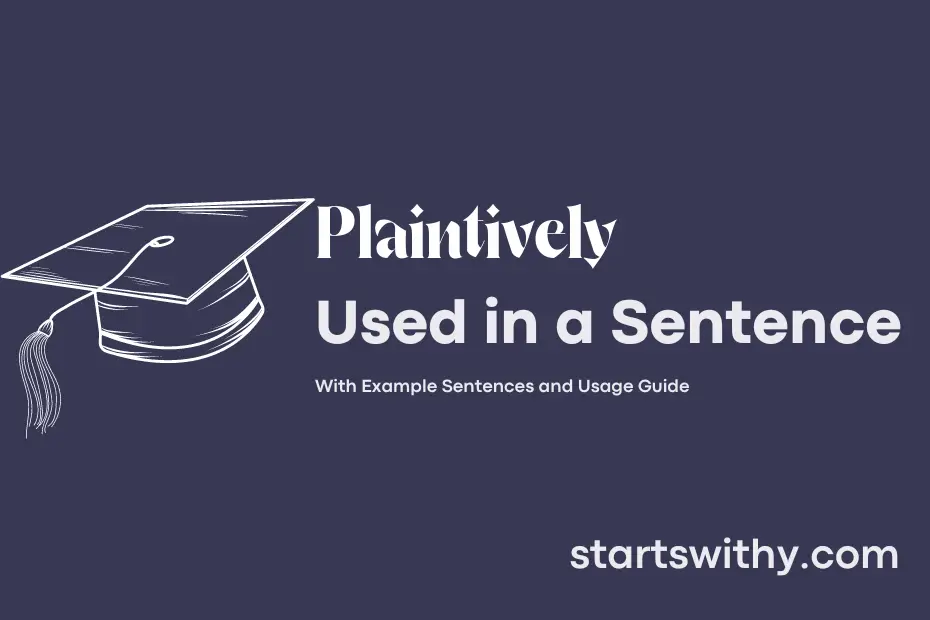Have you ever heard someone speak in a plaintively tone? When someone speaks plaintively, they are expressing sadness or longing in a gentle and melancholic way.
The word “plaintively” is an adverb that describes the manner in which someone speaks or expresses themselves. It is often used to convey a sense of sorrow, yearning, or dissatisfaction in a soft and pensive way.
7 Examples Of Plaintively Used In a Sentence For Kids
- “Where are you going?” she asked plaintively.
- “Can I have a turn, please?” he said plaintively.
- “I want to play with you,” she said plaintively.
- “Please help me tie my shoelaces,” he said plaintively.
- “I miss my friend,” she said plaintively.
- “I want a hug,” he said plaintively.
- “Can we read a story?” she asked plaintively.
14 Sentences with Plaintively Examples
- “Can you please explain that concept again?” she asked *plaintively during the lecture.*
- “I really need an extension on my assignment,” he pleaded *plaintively to his professor.*
- “I don’t understand this question at all,” she said *plaintively during the exam.*
- “I’m struggling to keep up with the readings,” he admitted *plaintively to his study group.*
- “I wish we had more study resources available,” she remarked *plaintively to her classmates.*
- “I can’t afford to buy all these textbooks,” he sighed *plaintively while browsing through the bookstore.*
- “I wish the library had longer hours,” she mused *plaintively as she left the campus library.*
- “I need help with my research project,” he said *plaintively to his professor.*
- “I don’t know how to solve this math problem,” she confessed *plaintively to her tutor.*
- “I feel overwhelmed with all these assignments,” he admitted *plaintively to his roommate.*
- “I don’t know how to improve my writing skills,” she said *plaintively during a writing workshop.*
- “I wish we had more opportunities for hands-on learning,” he expressed *plaintively during a class discussion.*
- “I’m not sure if I chose the right major,” she pondered *plaintively with her academic advisor.*
- “I need more guidance on how to prepare for my exams,” he requested *plaintively from his professor.*
How To Use Plaintively in Sentences?
Plaintively is used to describe something that is expressed in a sorrowful or melancholy way. When using plaintively in a sentence, it is important to consider the tone and context of the situation. Here is a helpful guide on how to correctly incorporate plaintively into a sentence:
-
Placement: In a sentence, plaintively usually comes before the verb it describes. For example, “She plaintively asked for help” or “He plaintively sang the sad song.”
-
Tone: When using plaintively, it is essential to convey a sense of sadness or sorrow in the expression. This word is often used to evoke feelings of sympathy or empathy in the listener or reader.
-
Context: Consider the context of the situation in which you are using plaintively. It is typically used to describe a person’s voice, tone, or actions when they are expressing sorrow or sadness.
-
Variety: You can use plaintively in a variety of sentences to convey different emotions. For example, “The child plaintively called out for their lost toy” or “The musician plaintively played the haunting melody.”
By following these guidelines and understanding the meaning of plaintively, you can effectively incorporate it into your writing or speech to convey a sense of sorrow or melancholy.
Conclusion
In conclusion, sentences with the keyword “plaintively” often convey a sense of sadness, longing, or desperation in a pleading or mournful manner. These sentences typically express deep emotion and evoke empathy from the reader by highlighting the speaker’s sorrow or distress. The use of “plaintively” adds a poignant and emotional layer to the sentences, creating a tone that is both heartfelt and emotive.
By incorporating “plaintively” into sentences, writers can effectively convey the speaker’s emotional state and engage readers on a deeply empathetic level. The word captures a specific type of emotional expression that is marked by a sense of melancholy or yearning, making it a powerful tool for writers looking to convey complex emotions in their writing.



